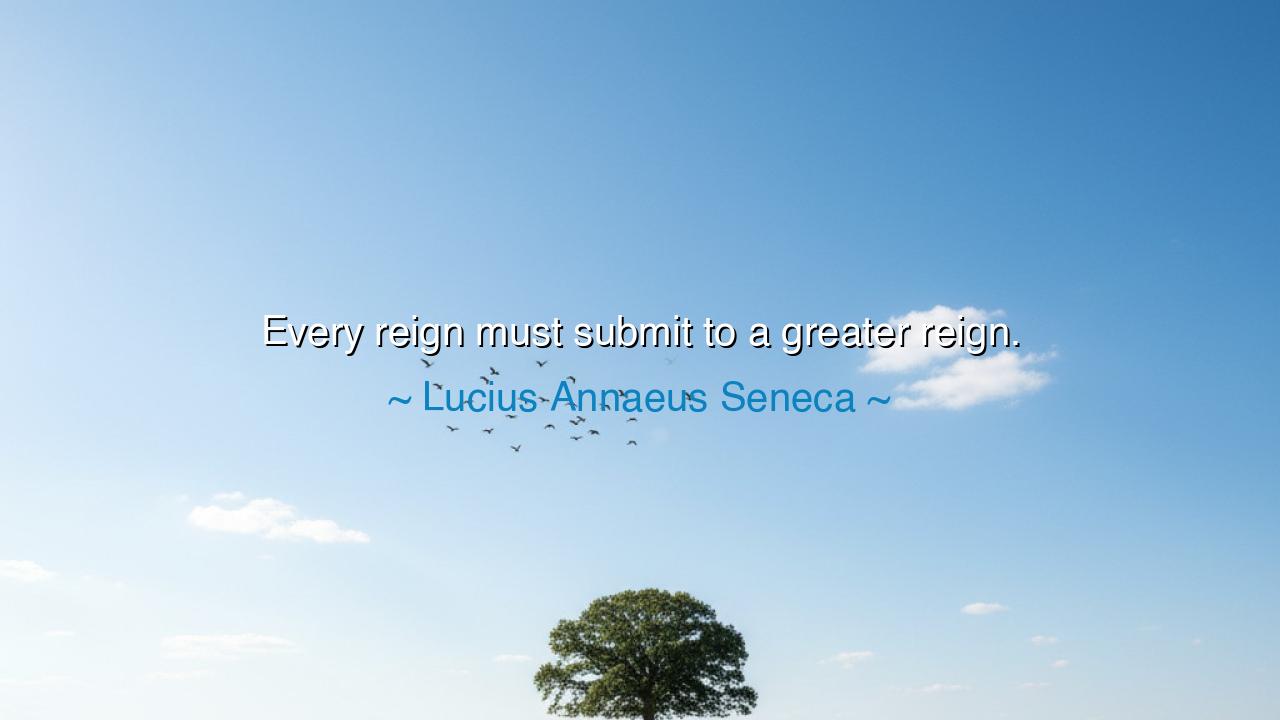
Every reign must submit to a greater reign.






In the vast theater of existence, no reign endures forever, for above every throne there rises a higher throne, and above every king a greater king. When Lucius Annaeus Seneca, the Stoic philosopher, declared, “Every reign must submit to a greater reign,” he spoke not only of earthly kingdoms, but of the eternal order that governs all life. His words remind us that all power is transient, and that even the mightiest rulers are but fleeting actors in the grand drama of the cosmos.
Reigns rise upon the strength of ambition and vision, yet they fall before forces greater than themselves—whether it be the judgment of time, the rebellion of peoples, or the unyielding hand of nature. The Roman Empire, which Seneca himself served as advisor to Emperor Nero, seemed unshakable in its glory. Yet Seneca, with a philosopher’s foresight, knew that even Rome’s greatness would one day bow before a higher reign: the march of history itself. This was not a prophecy of doom, but a lesson in humility for all who wield authority.
History bears countless examples of this truth. Consider the fall of Napoleon Bonaparte, who once commanded nearly all of Europe. His reign was dazzling and swift, built upon the fire of his genius and ambition. But when he set himself against the vastness of Russia and the combined will of other nations, he met a force greater than his own. In the snows of Moscow and the plains of Waterloo, his empire crumbled, proving that no matter how mighty a ruler may seem, there is always a higher power that cannot be defied.
Yet Seneca’s wisdom reaches beyond politics and empires. Even the reign of mortality itself must one day yield to the reign of eternity. All things in life—wealth, fame, even the body itself—are under the dominion of forces we cannot see. The wise man understands this and bows willingly to the higher order, living with virtue rather than clinging desperately to temporal crowns. In this way, he becomes free, even as kingdoms rise and fall around him.
Let this teaching be carried into the hearts of all generations: pride blinds the ruler who believes his reign supreme, while humility grants sight to the one who knows he is but a servant of something greater. Whether that greater force is fate, the will of the people, or the divine, it is the unseen master to which all must bow. Thus, live and lead with reverence, remembering always that no earthly throne is eternal. Only by recognizing the greater reign can one rule wisely and leave behind a legacy that endures beyond the crumbling of empires.






TONguyen Thi Oanh
I feel both challenged and reflective reading this quote. It highlights the transient nature of influence and control. Does this suggest that wisdom lies in understanding our temporary role in larger systems rather than clinging to power? I also wonder how this idea intersects with ethics: if every reign is ultimately accountable to a higher authority, should leaders strive to align their actions with principles beyond self-interest? How might this awareness shape leadership and governance today?
NMThu Nguyen Minh
This statement sparks reflection on the concept of hierarchy and inevitability. Is the greater reign literal, like conquest or succession, or more abstract, like the laws of fate or time? I’m curious whether Seneca intended this as a warning to rulers about hubris or a philosophical meditation on life’s natural order. Could this principle also guide how we approach challenges in our personal and professional lives, reminding us that nothing lasts forever?
DTTRAN DUC THIEP
I find this thought both humbling and somewhat comforting. It seems to suggest that ultimate accountability exists, even if it’s not immediately visible. Does this imply that ambition should be tempered with awareness of larger forces at play, whether moral, societal, or natural? I wonder how this perspective has influenced historical leaders who understood their own limits, and whether it might offer guidance to individuals today in navigating authority and power dynamics.
SPsun ph
Reading this, I feel intrigued by the cyclical nature of authority implied here. Could this idea extend beyond kings and emperors to modern systems, such as corporations or governments, where shifts in power are inevitable? I’m curious about the ethical dimension: does recognizing that every reign answers to a greater reign encourage fairness and responsibility, or is it merely a reminder of the futility of resisting change?
TAchu thi anh
This quote makes me think about the impermanence of power and authority. Is Seneca suggesting that no matter how strong or dominant a ruler appears, there is always a higher force—whether divine, natural, or societal—that ultimately supersedes them? I wonder if this principle can also apply to personal ambition or influence in daily life. Does understanding this inevitability help temper ego and encourage humility among leaders and individuals alike?